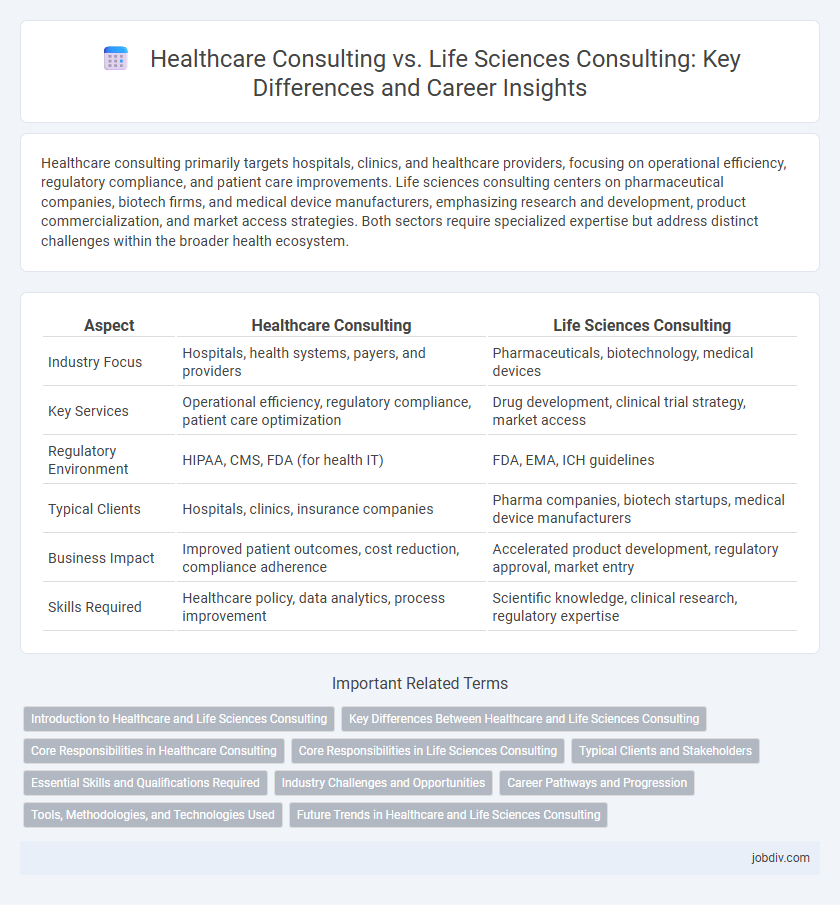Healthcare consulting primarily targets hospitals, clinics, and healthcare providers, focusing on operational efficiency, regulatory compliance, and patient care improvements. Life sciences consulting centers on pharmaceutical companies, biotech firms, and medical device manufacturers, emphasizing research and development, product commercialization, and market access strategies. Both sectors require specialized expertise but address distinct challenges within the broader health ecosystem.
Table of Comparison
| Aspect | Healthcare Consulting | Life Sciences Consulting |
|---|---|---|
| Industry Focus | Hospitals, health systems, payers, and providers | Pharmaceuticals, biotechnology, medical devices |
| Key Services | Operational efficiency, regulatory compliance, patient care optimization | Drug development, clinical trial strategy, market access |
| Regulatory Environment | HIPAA, CMS, FDA (for health IT) | FDA, EMA, ICH guidelines |
| Typical Clients | Hospitals, clinics, insurance companies | Pharma companies, biotech startups, medical device manufacturers |
| Business Impact | Improved patient outcomes, cost reduction, compliance adherence | Accelerated product development, regulatory approval, market entry |
| Skills Required | Healthcare policy, data analytics, process improvement | Scientific knowledge, clinical research, regulatory expertise |
Introduction to Healthcare and Life Sciences Consulting
Healthcare consulting focuses on improving the efficiency, quality, and compliance of healthcare providers, payers, and systems by addressing clinical operations, patient care, regulatory requirements, and health IT integration. Life sciences consulting involves advising pharmaceutical, biotechnology, and medical device companies on drug development, market access, regulatory strategy, and commercialization to accelerate innovation and regulatory approval. Both sectors require specialized knowledge but differ in client base and regulatory environment, with healthcare consulting oriented towards service delivery and life sciences consulting targeting product development and scientific advancement.
Key Differences Between Healthcare and Life Sciences Consulting
Healthcare consulting primarily focuses on improving hospital operations, patient care delivery, and regulatory compliance within the healthcare system, while life sciences consulting centers on pharmaceutical R&D, biotech innovation, and commercialization strategies. Key differences include healthcare consulting's emphasis on systemic efficiency, clinical workflow optimization, and healthcare policy adherence compared to life sciences consulting's focus on drug development pipelines, clinical trials, and market access strategies. Understanding these distinctions enables organizations to select specialized consulting services aligned with industry-specific challenges and growth opportunities.
Core Responsibilities in Healthcare Consulting
Healthcare consulting primarily focuses on improving hospital operations, optimizing patient care delivery, and navigating regulatory compliance within healthcare systems. Consultants analyze clinical workflows, implement electronic health records (EHR) systems, and develop cost reduction strategies tailored to healthcare providers. Their core responsibilities include enhancing patient outcomes, ensuring adherence to healthcare policies, and driving operational efficiencies in medical facilities.
Core Responsibilities in Life Sciences Consulting
Life Sciences Consulting primarily focuses on research and development strategy, regulatory compliance, and market access for pharmaceutical, biotech, and medical device companies. Consultants in this field analyze clinical trial data, advise on product lifecycle management, and help navigate complex healthcare regulations. Their expertise supports innovation, accelerates drug development, and ensures successful commercialization in the life sciences sector.
Typical Clients and Stakeholders
Healthcare consulting primarily serves hospitals, clinics, insurance companies, and government health agencies focused on improving patient care, operational efficiency, and regulatory compliance. Life sciences consulting targets pharmaceutical companies, biotechnology firms, and medical device manufacturers, emphasizing research and development, clinical trials, and market access strategies. Key stakeholders in healthcare consulting include medical professionals and healthcare administrators, while life sciences consulting involves scientists, regulatory bodies, and commercial teams.
Essential Skills and Qualifications Required
Healthcare consulting demands expertise in healthcare systems, regulatory compliance, and patient care optimization, emphasizing skills in data analysis, medical knowledge, and stakeholder communication. Life sciences consulting requires a deep understanding of biology, pharmaceuticals, clinical research, and product development, with qualifications often including scientific degrees and experience in drug development or biotechnology. Both fields prioritize problem-solving abilities, strategic thinking, and proficiency in navigating complex healthcare regulations and market dynamics.
Industry Challenges and Opportunities
Healthcare consulting addresses challenges such as regulatory compliance, rising costs, and patient care optimization, offering opportunities in digital health transformation and value-based care models. Life sciences consulting focuses on drug development, regulatory approvals, and market access, with growth potential in personalized medicine and biotechnology innovation. Both sectors demand expertise in data analytics, regulatory landscapes, and evolving technological advancements to drive sustainable industry progress.
Career Pathways and Progression
Healthcare consulting primarily involves advising hospitals, clinics, and healthcare providers on operational efficiency, regulatory compliance, and patient care improvement, offering career progression from analyst roles to managerial and partner positions within healthcare systems. Life sciences consulting centers on pharmaceutical, biotechnology, and medical device companies, emphasizing R&D strategy, market access, and regulatory affairs, with career advancement often leading to specialized expert or executive roles in product development and commercialization. Both pathways demand strong analytical skills and industry knowledge but differ in focus areas, with healthcare consulting geared towards service delivery optimization and life sciences consulting directed at innovation and market strategy.
Tools, Methodologies, and Technologies Used
Healthcare consulting employs electronic health records (EHR) systems, clinical decision support tools, and patient data analytics platforms to optimize hospital operations and patient outcomes. Life sciences consulting utilizes advanced simulation software, bioinformatics tools, and regulatory compliance platforms to accelerate drug development and clinical trials. Both domains integrate AI and machine learning technologies to enhance predictive analytics and evidence-based decision-making.
Future Trends in Healthcare and Life Sciences Consulting
Healthcare consulting is increasingly driven by digital transformation, personalized medicine, and AI-powered diagnostics, enhancing patient outcomes and operational efficiency. Life sciences consulting focuses on integrating advanced biotechnologies, such as gene editing and biologics development, with regulatory strategy and market access optimization. Both sectors emphasize sustainability and data analytics to navigate evolving healthcare ecosystems and accelerate innovation pipelines.
Healthcare Consulting vs Life Sciences Consulting Infographic

 jobdiv.com
jobdiv.com